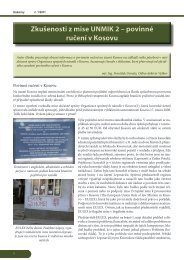TRADOC Pam 525-3-7-01 - TRADOC - U.S. Army
TRADOC Pam 525-3-7-01 - TRADOC - U.S. Army
TRADOC Pam 525-3-7-01 - TRADOC - U.S. Army
- No tags were found...
Create successful ePaper yourself
Turn your PDF publications into a flip-book with our unique Google optimized e-Paper software.
<strong>TRADOC</strong> <strong>Pam</strong> <strong>525</strong>-3-7-<strong>01</strong>courage required of each Soldier to face the mentally, emotionally, and physically draining natureof war, danger, isolation, ambiguity, boredom, fatigue, and loss within a lethal high OPTEMPOenvironment.Great captains and military theorists have commented on these subjects for hundreds of years.As early as 400 before the Common Era—Xenophon wrote in his timeless campaign narrativeAnabasis, “I am sure that not numbers or strength brings victory in war, but whichever army goesinto battle stronger in soul; their enemies generally cannot withstand them.” Similarly,Napoleon’s maxim that in war the moral is to the material as three is to one, supports theascendancy of moral factors in battle. Clausewitz includes important observations on war’smoral forces in On War.Morale…moral elements are among the most important in war. They constitute the spiritthat permeates war as a whole, and at an early stage they establish a close affinitywith the will that moves and leads the whole mass of force, practically mergingwith it, since the will is itself a moral quantity. . . . The spirit and other moralqualities of an army, a general or a government, the temper of the population ofthe theater of war, the oral effects of victory or defeat-all these vary greatly. Theycan moreover influence our objective and situation in very different ways.Consequently . . . they can no more be omitted from the theory of the art of warthan can any of the other components of war. To repeat, it is paltry philosophy ifin the old-fashioned way one lays down rules and principles in total disregard ofmoral values. . . . One might say that the physical [factors] seem little more thanthe wooden hilt, while the moral factors are the precious metal, the real weapon,the finely honed blade. History provides the strongest proof of the importance ofmoral factors and their often incredible effect: this is the noblest and most solidnourishment that the mind of a general may draw from a study of the past. 61Morale is a Soldier’s level of motivation, commitment, and enthusiasm for accomplishingunit mission objective under stressful conditions. 62 Morale is an individual attribute within thecontext of the unit and generally consists of many broad components including common purpose,commitment to the unit’s identity, confidence, enthusiasm, and persistence within a militaryframework. High morale is a characteristic of effective units. Morale is an intangible, dynamiccharacteristic that strengthens confidence in oneself, one’s equipment, the unit, and the unit’sleadership. Morale rests on an intrinsic belief in the cohesiveness of the unit and purpose of themission while recognizing that completing the mission requires self-sacrifice at many levels.Morale is more complex than simple job satisfaction. It a sense that service is meaningful,important and makes a difference. Feeling the respect of others in the form of praise,promotions, awards, and the appreciation of superiors, peers and subordinates, alike, enhancesself esteem and sense of worth to others. It is this value to others, and commitment not to letothers down, especially in times of danger and crisis, which forms the foundation of the warriorspirit. This external esteem translates to pride in oneself and the unit, which together promotecohesion and a collective sense of purpose shared with other unit members. 6360



